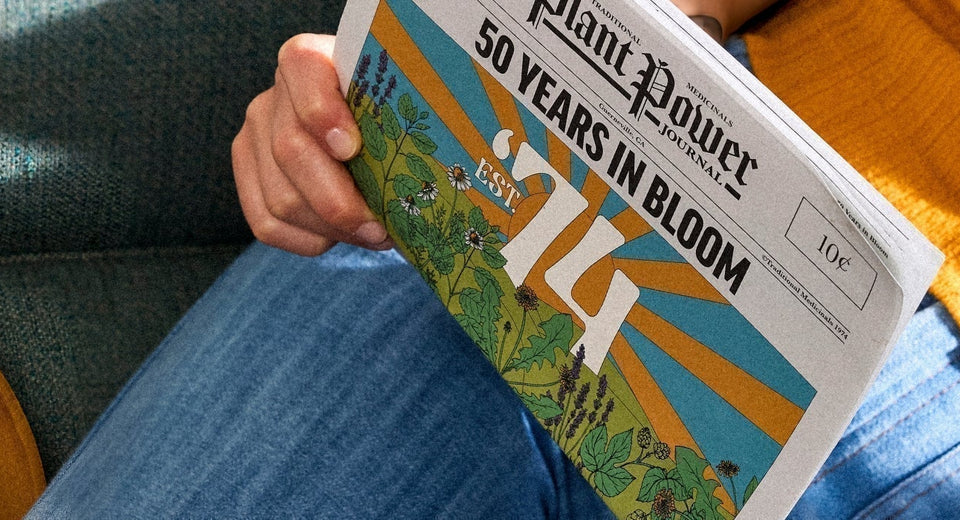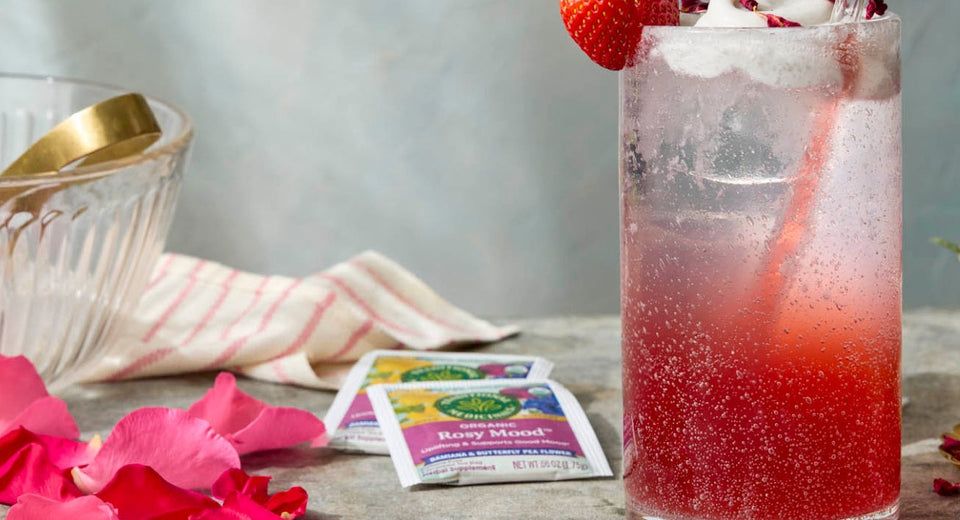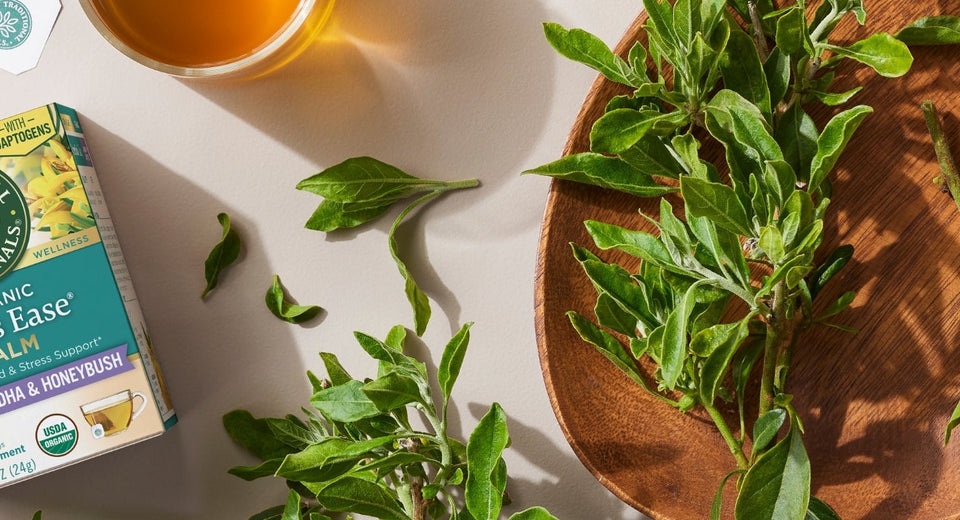
Plant People: Ann Armbrecht of The Sustainable Herbs Project
As our world is rapidly changing, many are reawakening to the ancient wisdom of plants. Just a few decades ago, some considered Western herbalism to be on the brink of extinction. Now, the herbal supplement market is booming and people are seeking natural alternatives more than ever. Having access to these natural medicines is a gift, and with that gift comes great responsibility. As herbalists, producers of herbal supplements, and natural products enthusiasts, we must be certain that the herbal medicines we’re selling or consuming are also medicine for the land and its people–an ethic and commitment we’ve made here at Traditional Medicinals for over 40 years.
So when we heard about Ann Armbrecht’s Sustainable Herbs Project, we immediately offered support. Ann’s work as a writer and anthropologist, as well as her work in herbal advocacy, drew her to investigate the herbal supplements industry. Her efforts towards greater transparency in the industry echo our own, and we applaud her commitment to high standards of quality and ethics. With the help of Josef Brinckmann, our Research Fellow of Medicinal Plants and Botanical Supply Chain, and other leaders in the herbal Industry, Ann traveled to some of the world’s most far flung sourcing communities to document what it takes to create sustainable and transparent supply chains.
If you haven’t yet seen Ann’s first film, Numen: The Nature of Plants, we highly recommend it. Numen discusses the ancient art and science of herbalism and encourages the audience to get to know local plants and to cultivate herbal medicines in our own backyard. Ann’s latest venture—an online documentary series and website entitled The Sustainable Herbs Project—tells the behind-the-scenes story of botanical wellness products. From collectors and cultivators to the final product, the short films document the real benefits of purchasing organic, sustainable, and ethically sourced products.
You can find more information on The Sustainable Herbs Project on Ann’s website here, where videos and stories will soon be posted regularly. In anticipation of this project’s launch later this fall, we thought we would share a conversation we had with Ann, so you can get to know this passionate plant steward a little better.

Q: What drew you to herbalism?
Ann: I first learned about herbalism from Deb Soule, who then suggested I attend the NE Women’s Herb Conference, which led me to enroll in an apprenticeship with Rosemary Gladstar at Sage Mountain. I was in a highly competitive graduate program at the time and had just returned from 18 months in Nepal, where I’d gone to do research for a doctorate in Anthropology.
I’d gone to Nepal with a lot of romantic ideas about the villagers’ relationship to the land and the wisdom of indigenous knowledge—ideas that were quickly dispelled as I observed the reality of their lives. But beneath those romantic ideas, I also found a wisdom that I discovered in the herbal medicine I learned from Rosemary: a sense of the sacredness of the earth, a quality of respect and restraint in interactions with the environment, a focus on relationship rather than ownership, and an understanding of the spiritual and cultural dimensions of healing. To me these values seem like a key part of the cultural shift needed to develop more sustainable ways of living, and not only did herbal medicine embody these values, it did so in a tradition rooted in my own physical and cultural landscape.
Q: Many herbalists know and love your 2013 film Numen. Could you tell us a little bit about the inspiration behind this compelling, plant-based film?
Ann: Learning which plants to grow, when to harvest them, and how to prepare remedies to care for others was incredibly empowering. It allowed me to connect with the source of the medicine I prepared for myself and my 18 month daughter, a way to balance out all the other products I depended on whose source was too distant and whose production I couldn’t control. Making my own medicine was even more deeply satisfying than growing my own food.
For most people, herbal medicine is a brown glass bottle of tincture or a white plastic container filled with capsules, not a philosophy for changing the world. And so we produced Numen to celebrate these values and to bring them to a wider audience. To reach that larger audience I had to address concerns about quality and sustainability in these supplements. Herbalists know that all herbal products aren’t equal, but because these issues aren’t discussed in wider circles, especially the media, many people aren’t aware of the vast range in quality. But we could only touch on these issues in Numen, which led me to my current interest in following herbs though the supply chain.
Q: Now you are on to documenting another big area of herbalism—sustainable sourcing. What is the idea behind The Sustainable Herbs Project?
Ann: For years I’ve been struck by what seems like a contradiction at the heart of herbal medicine. Herbalists talked about how intention when harvesting plants and preparing remedies is part of the healing power of a plant. Yet few address the mechanics of how to source enough plants to meet demand, or what that intention might look like in industrial production. They’d talk about how a practitioner’s relationship with a plant is as important in healing as the constituents of the plant but then recommend remedies produced no differently from any other commodity on the market. There seems to be a big disconnect between a plant as a living entity and a plant as a commodity. No one was talking about it—not because they were hiding anything, but because it was very difficult to get information.
And so I created The Sustainable Herbs Project to provide the information so that we can all make more informed decisions and have the information needed to hold companies more accountable for the claims that they make. I want to help spur a sustainable herbs movement that is as widespread as the sustainable food movement.
Q: You’ve been following herbs through the supply chain all over the world. What has been the most surprising part of your discoveries?
Ann: A surprising discovery is the incredible importance of organic certification. I’ve always bought organic food and herbs, because they’ll be healthier for myself and my family. This project has really made it clear to me how important buying organic products are for the world, for the environment, and for the people growing and processing those products.
This has obvious impacts for the immediate health of people and the environment, but this project has helped me see the economic impacts as well. Pesticide residues are showing up on plants harvested from places where none were applied, because the soil, air, and water are polluted. Those herbs can’t then legally be sold as organic, which hurts the people on the bottom of the supply chain—the ones least responsible for applying those chemicals in the first place. Until and unless we shift away from chemical production, someone somewhere is going to have to pay for the presence of these chemicals in the soil, the water, the air. Organic is a way of beginning to do that.
The most surprising thing for me is what a tremendous difference individuals can make in improving the supply chain of herbal products. Like many people, I get so discouraged by the state of the world, so seeing the way individual actions have an impact has been incredibly inspiring. Traditional Medicinals’ sustainability expert and Research Fellow, Josef Brinckmann, is one of those individuals—and TM is one of those companies, and I’m not just saying that because you are interviewing me.
In India, we visited farmers and farming communities that were completely different because of their ability to grow organic herbs for companies committed to sourcing herbs responsibly. Responsible sourcing offers a meeting between cultures and companies–one that is an exchange rather than a hand out. Broadly speaking, responsible sourcing inspires me because it shifts our focus from asking, “How can I get the best product for myself or my family?” to “How can I use my purchasing power to create a world where the best products are available for everyone?”

Q: As you know, many of our herbs come from their native habitat, and we are passionate about elevating the quality of life for farming communities and wild collectors. We are happy to see you telling their stories and shining a light on the social and environmental issues facing these collection communities. As plant lovers, what do you think we can do to support both the plants and those who are their caretakers?
Ann: First, be willing to pay more. Sourcing and producing high quality herbs is a lot of work and that work costs more. Ask questions not just about the quality of the herbs and heavy metal testing, etc., but also ask about how much people are paid along the supply chain—especially those on the bottom. Second, buy organic. In buying organic you are buying more than a ‘clean’ product for yourself. You are aligning yourself to a standard which, imperfect though it might be, is ultimately about regeneration and caring for the earth.
Q: One of the sustainability standards that we encourage the wild collection operations to implement is the FairWild Standard. This requires rigorous species risk assessment, resource assessment, monitoring and inspections and also promotes “the sustainable use of wild-collected ingredients, with a fair deal for all those involved throughout the supply chain.” Since you followed the herbs from collector to product, how well do you think this FairWild system is currently working?
Ann: FairWild is an incredible standard, and as anyone involved in it will say, it needs more people buying into it for it to succeed. But what they are trying to do has never been done before, and if it seems hard compared to other standards or other things, it is because FairWild is trying to do it right. And so it only seems hard because everything else isn’t hard enough. And it seems expensive because everything else is so undervalued. There are a handful of companies and people who are working incredibly hard to make it work, and they need help. We can all help it be more likely to succeed by asking companies who import herbs whether they have FairWild products, and, if not, why not, and to encourage them to look into sourcing some. And to buy products that are FairWild certified and to let the companies who are taking the risk of sourcing FairWild ingredients, because it is a risk, that you appreciate their doing so.
Are you eager to read more of our sourcing stories? Check out the Community section of our Plant Power Journal, or read this Sustainability Q & A with our herbal sourcing expert Josef Brinckmann.




